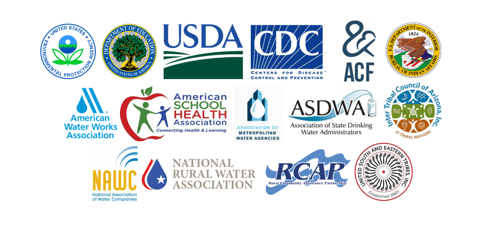This Memorandum of Understanding on Reducing Lead Levels in Drinking Water in Schools and Child Care Facilities represents an unprecedented partnership to focus attention on testing for lead in drinking water for schools and child care facilities between:
- U.S. Environmental Protection Agency, Office of Water
- U.S. Department of Agriculture, Rural Development Agency
- U.S. Department of Education, Office of Safe and Supportive Schools
- U.S. Department of Health and Human Services, Centers for Disease Control and Prevention
- U.S. Department of Health and Human Services, Indian Health Service
- U.S. Department of Health and Human Services, Agency for Children and Families’ Office of Head Start and Office of Early Childhood Development
- U.S. Department of the Interior, Bureau of Indian Affairs and Bureau of Indian Education
and
- American Water Works Association
- American School Health Association
- Association of Metropolitan Water Agencies
- Association of State Drinking Water Administrators
- Inter Tribal Council of Arizona, Inc.
- National Association of Water Companies
- National Rural Water Association
- Rural Community Assistance Partnership
- United South and Eastern Tribes
The signatories have agreed to encourage schools and child care facilities to take action. Actions include testing drinking water for lead; disseminating results; and taking appropriate and necessary steps to correct problems. The signatories also agree to encourage PWSs to assist schools and child care facilities in understanding and reducing lead exposure from drinking water.
“The Trump Administration is prioritizing efforts to identify and reduce lead contamination while ensuring children impacted by lead exposure are getting the support and care they need,” said EPA Administrator Andrew Wheeler. “This MOU supports our Lead Action Plan and shows our commitment to work with federal and non-federal partners to ‘get the lead out’ of drinking water to the greatest extent possible.”
“CDC is committed to preventing childhood lead exposure before harm occurs. Partnership is critical in our commitment to help address the ongoing threat of lead in the environment and improving health outcomes for our nation’s most vulnerable citizens – our children.” - Patrick Breysse, PhD, CIH, Director of the CDC’s National Center for Environmental Health
“My priority is for our BIE students to receive a quality education and study in safe facilities and environments, one critical environmental factor is safe drinking water. Indian Affairs is actively working to ensure that children in our schools are provided with safe drinking water.” - Tara Sweeney, Assistant Secretary- Indian Affairs
Executive
“Water is sacred in all forms and especially with regard to the water we provide to our children. By collaborating with federal agencies and nonprofit organizations, we will maximize our efforts toward bringing safe drinking water to schools nationwide,” stated Maria Dadgar, Executive Director, Inter Tribal Council of Arizona (ITCA),“It is a necessary and honorable objective to work on this initiative. We look forward to having access to resources and tools for improving water quality for American Indian and Alaska Native children and beyond.”
United South Eastern Tribes (USET)
"The Rural Community Assistance Partnership (RCAP) is honored to be a part of the MOU focused on Reducing Leading Levels in Drinking Water in Schools and Child Care Facilities,” said RCAP, CEO Nathan Ohle. “RCAP partners across the country see the impact this work has on children in rural communities across the country and are dedicated to working with our rural communities to encourage lead testing, disseminate information to stakeholders, and overall reduce children’s exposure to lead in their drinking water."

- Memorandum of Understanding on Reducing Lead Levels in Drinking Water in Schools and Child Care Facilities (PDF)(20 pp, 1 MB, November 2019)
